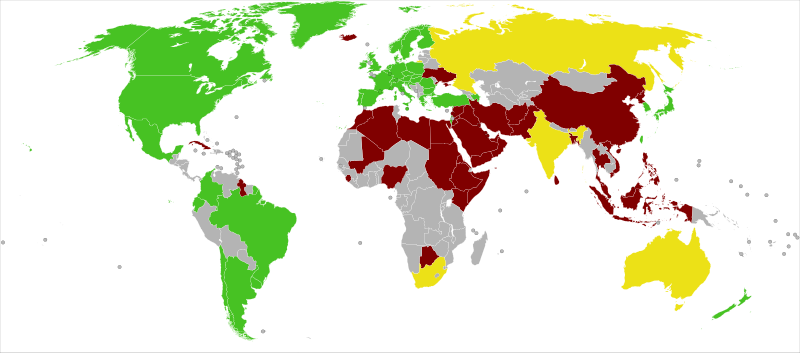
Today’s illustration shows the world-wide legal status of pornography. Green: pornography is legal, yellow: pornography is subject to some restrictions, red: pornography is forbidden, grey means missing data. The international legal situation knows only two extremes: pornography is completely forbidden, or it’s completely open (usually with age restrictions and explicit bans on criminal practices like bestiality and rape-, child-, and violent pornography).
The distribution of countries with a strict prohibition policy is rather patchy. There is every kind of government, reaching from socialist to theocratical states. Owning pornographic material can lead to severe punishment in some of these countries, including several years of imprisonment. A few years ago, Saudi authorities claimed they were “winning the war against pornography on the internet” (https://en.wikipedia.org/wiki/Pornography_in_Asia#Saudi_Arabia)
What’s making them so angry?
Last week I have emphasized the quasi-religious aspects of porn. So it would be easy to identify allegedly backward societies on the basis of their porn policy. But it’s not that easy. Porn is forbidden in most Islamic countries, but also in China. The sturdy defence against porn can’t be based on its echoes of religion solely.
Porn polarizes. This kind of reaction is true for things that are touching somebody to the quick. Love it or hate it; legalize or prohibit it. Porn is provoking an emotional reaction. Watching people having sex, people that are not meant to kill each other nor hide their beauty evokes a feeling of paradise or Utopia in the spectator (or makes him feel uneasy, according to his preferences). And here things become political.
Wait – first religion, now policy?
Imaginations of a better world have long traditions in the history of mankind. In many societies they have become part of the political agenda. This is especially true for extremely conservative countries and societies, where strict religious laws define the basis of morality, and it is true for socialist countries, too, because there must be only one Utopia: the era of communism. Alternatives which are strictly apolitical are breaking these aspirations. They are disturbing public safety. They have to be opposed.
This is the reason why porn is still so subversive: porn is making the promise of satisfaction (the little sister of redemption). But it’s satisfaction without purpose. Porn has no real agenda, and this is making strict societies nervous: if it’s neither leading to a political Utopia nor consolidating the authorities, then it must be wrong and dangerous. The interpretative souvereignity of the system leaders is getting questioned, and this must not be tolerated.
This is the political environment of pornography. The thing itself isn’t political, but the question of its meaning definitely is. And please don’t think this could never happen in the country you’re living in.
Stay alert,
Mason Squelch
(Image: World map of pornography laws. Source: Wikipedia)




